DECENTRALIZED AND CENTRALIZED APPLICATIONS : BINANCE VS BINANCE DEX
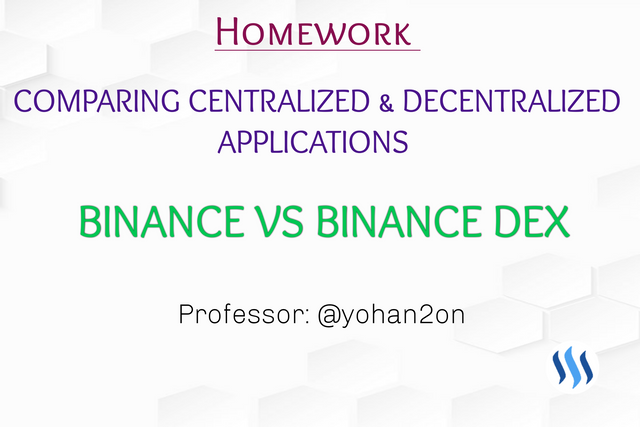
CRYPTO EXCHANGE PLATFORM
A cryptocurrency exchange is an online-based platform that allows the exchange of cryptocurrencies or trading of various crypto into fiat currencies. As a result, they provide easy access to numerous tokens which would otherwise be difficult to obtain. Exchanges therefore serve as intermediaries between crypto traders and tokens and sometimes other traders as well.
A general overview of the numerous exchange platforms in existence shows two main types. These are; Centralized and Decentralized Exchanges.
CENTRALIZED EXCHANGES
These are exchanges whose activities are regulated and backed by an organization. Here, traders place their trust in third party organizations or bodies to oversee their transactions and secure their assets in order to prevent the possibility of forgetting the keys necessary to access their precious tokens.
Your account is therefore monitored alongside any tokens you might be storing there as well. Aside this, centralized exchanges also offer various derivatives including margin trading, lending and futures trading to its traders. This therefore allows traders to maximize their earning potential on crypto exchanges.
Also, there is a support system that will guide you in case of any problems or challenges on the platform.
Examples of Centralized exchanges; Binance, Huobi Pro, Coinbase, Kraken, etc.
DECENTRALIZED EXCHANGES (DEX)
Unlike centralized exchanges, DEXs are completely opened sources platforms whose activities are run solely by its users. Trades are carried out on a peer-to-peer basis and users take full charge of their account's operations and security. Usually, DEX's require traders to have an additional digital wallet as they do not offer a storage feature for safekeeping of your assets.
They are therefore very resistant to hacking. This is because private information is not shared with any governing body and funds are solely monitored by the individual. Also, listing new tokens is very easy here which is why ICO's are normally started on DEX's. This removes all the scrutiny involved in getting your coin listed on a centralized exchange.
However, since there is no third party to oversee its activities, there is no support system to guide you which is why this platform is not recommended for beginners.
Typical examples of DEX's are; JustSwap, Uniswap, Binance DEX, Venus, etc.
LET'S NOW COMPARE BINANCE TO BINANCE DEX
BINANCE
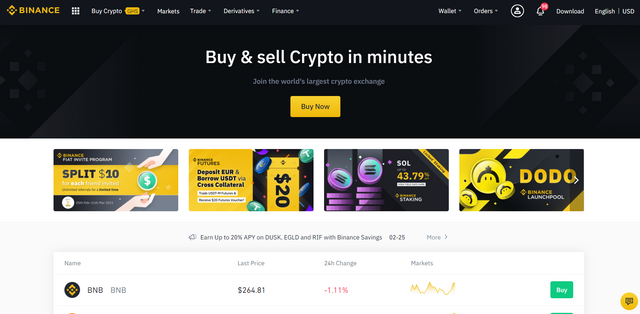
Binance interface source: https://www.binance.com/en
Founded in 2017, Binance is the world's leading cryptocurrency exchange platform with more than 944 trading pairs and 281 coins according to coingecko. Binance provides a user friendly trading atmosphere with a 24/7 customer support system ready to assist with any challenges.
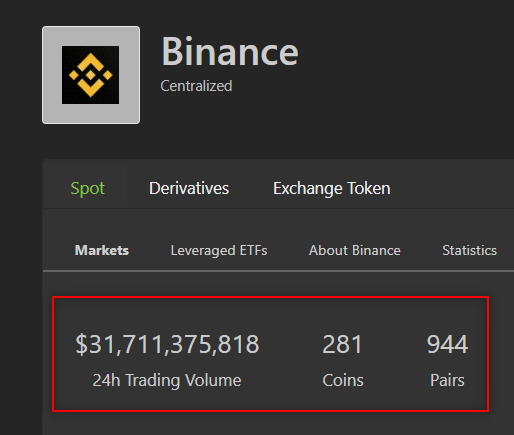
Binance also provides several derivatives for traders to choose from. These include a variety of options such as the USD-M FUTURES, COIN-M FUTURES, Leveraged tokens and Vanilla options.
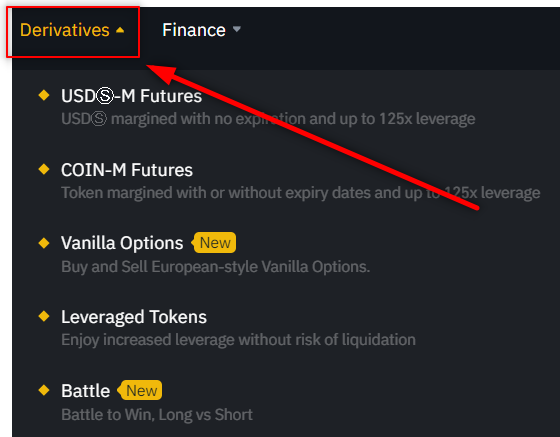
Aside these derivatives, the markets provided here favor lots of traders as most of them are backed by the stable usdt currency preferred by many crypto traders.
PROS
- 24/7 customer support in the event of any problem.
- Allows purchase of crypto assets using credit cards and bank transfers.
- Provides several derivatives including margin and futures trading.
- Less fees are required (0.01%) and doesn't need any gas fees to execute transactions.
- Funds are regulated and insured for unforseen contingencies.
- Provides various tutorials to assist beginners in trading.
- Prevents the enlistment of fraudulent tokens.
- KYC and 2 factor verification helps to secure your account against unauthorized access.
CONS
- Assets are prone to a hacking event as funds are stored with the exchange server.
- Less privacy since trading data is shared with exchange server.
- Control of your account is shared with the exchange.
- Subject to failure during a server breakdown.
BINANCE DEX
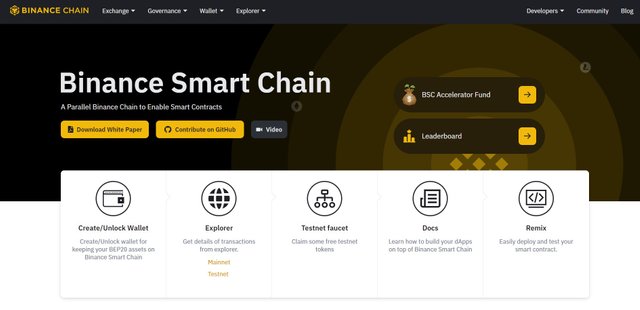
Binance Dex Interface source: https://www.binance.org/en/smartChain
Unlike the popular Binance platform which offers its own wallet for the storage of purchased assets, binance dex requires you to link an external wallet before being able to enjoy its full features.
However, trading here is limited to only a few markets. Unlike the Binance exchange that offers over 280 coins and 900+ trading pairs, this one offers only about 106 coins and 151 trading pairs.

Here traders take full control of their assets as they are not subject to further scrutiny by any board and are less susceptible to a hacking event.
However, most of the trading pairs here are against BNB which might not be ideal for most traders who either prefer to trade against common pairs like tether or btc.
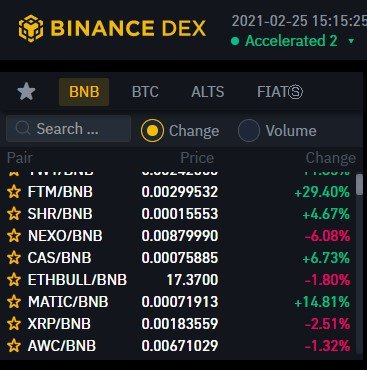
PROS AND CONS OF USING BINANCE DEX
PROS
- Total control over your assets since assests are stored on a private wallet whose keys are in your custody.
- Resistant to hacking event since account control is solely done by the user and funds are stored on private wallets.
- No single point failure as DEXs run on nodes all over the cloud.
- Trades are very fast since they are done by individual traders.
- Cannot be shut down by governments due to its operation on a variety of nodes across the cloud.
- Easier to list new tokens than the centralized exchange (Binance).
CONS
- Does not accept credit cards or bank transfers.
- Lacks derivatives such Futures and Margin trading.
- Lacks customer support system.
- More expensive due to higher trading fees.
I would appreciate your thoughtful contributions in the comment section as well. Thank you for your atttention.
Many thanks to the steemit team ( @steemcurator01 & @steemcurator02) for this initiative.
To the attention of professor @yohan2on


Hi @njaywan
Thanks so much for attending my 3rd Crypto lecture and for your effort in doing the homework task.
Feedback
This is excellent work. Well done!
Homework task completed
10
Twitter Share: https://twitter.com/bananmuni/status/1364976265858588677?s=19